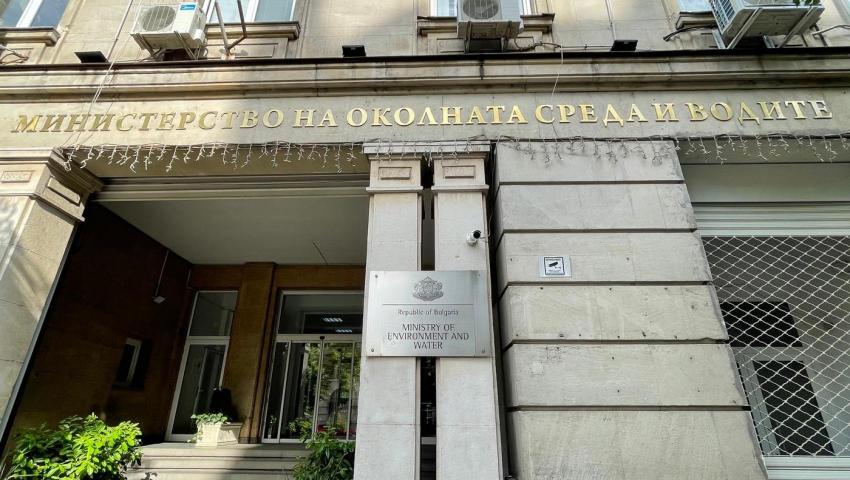The MoEW is already working on correcting the "Climate Energy" plan according to the recommendations of the EC

The Ministry of Environment and Water (MoEW), together with the Ministry of Energy, started active work to reflect the recommendations of the European Commission to Bulgaria in the process of updating the Integrated Plan in the field of energy and climate 2021 - 2030 (INPEC) with aim to raise its ambitions in line with the agreed goals for 2030. This was announced by the environmental ministry.
The MoEW is responsible for developing the "Emissions and Absorption of Greenhouse Gases" direction from the "Decarbonization" dimension in INPEC. This includes: presentation of current greenhouse gas emissions and removals – provided by the National Greenhouse Gas Emissions Inventory; estimation of projected greenhouse gas emissions and removals up to 2030 – provided by integrated modeling of all sectors; assessment of saved emissions from policies and measures to reduce greenhouse gas emissions in individual sectors.
The aim is to present the individual policies and measures provided by the sector ministries with measurable quantitative indicators, so that the saved greenhouse gas emissions can be estimated and the financial resources required for the implementation of the specific policies and measures can be indicated.
Alignment with the requirements of the Ready for Target 55 package in hard-to-decarbonize sectors such as industry and agriculture is in its final stages, after the Carbon Border Adjustment Mechanism was introduced and the reporting of shipping emissions and their inclusion in The emissions trading system. After receiving the latest estimates and scenarios of INPEC prepared by external experts, the MoEW will assist the Ministry of Energy in valuing emissions from specific policies and measures.
An important issue both for Bulgaria and for other member states updating their plans according to the Commission's recommendations is that climate change policies have their continuity and consistency beyond the INPEC horizon of 2030. For this purpose, the MoEW has developed and proposed for public discussion Law amending and supplementing the Climate Change Limitation Law (CCL), which includes a long-term goal of climate neutrality of the Bulgarian economy by 2050.
For the transition to be smooth, predictable and socially acceptable, ambitious but achievable intermediate goals are needed. Efforts are aimed at implementing a comprehensive approach to reducing emissions in specific economic sectors and their absorption by other sectors - from preserved forest and water ecosystems and through good practices in agriculture and forestry. The EC describes in its recommendations that the measures in these sectors are extremely important and must be formulated and adopted in an active process of dialogue with the interested parties. Apart from the update of INPEC, these measures will also be included in the updates of the Long-Term Strategy for Mitigation of Climate Change until 2050 of the Republic of Bulgaria and the National Strategy for Adaptation to Climate Change.
The European Effort Sharing Regulation, which covers the sectors of road transport, building heating, agriculture, small industrial installations and waste management, sets individual targets for member states. An individual target has been set for Bulgaria to reduce greenhouse gas emissions from these sectors in the amount of -10% by 2030 compared to 2005. The defined policies and measures for the implementation of this target will be updated in the final version of the plan. After consultation with stakeholders, the role of MoEW will be to expertly and realistically assess the potential for emission savings from these measures.
In the recently published guidelines, the EC is betting on a wide range of solutions regarding carbon sequestration both through industrial processes and through the preservation and improved functioning of ecosystems, natural landscapes, soils and environmental components. Bulgaria has a high potential for carbon storage in biomass and soils, but this sector cannot compensate for the delayed reduction of emissions from other sectors such as energy and transport. There is still no accurate and accepted assessment of the potential of industrial capture, storage and utilization of carbon dioxide in large energy and industrial installations. The challenge for the energy industry and other industries is to increase demand and innovation for this type of solution. They will be addressed in the INPEC update.
In cooperation with the Ministry of Energy, MoEW will continue to publish up-to-date information on the progress of INPEC, as well as participate in public discussions and meetings with interested parties on the updated version of INPEC and its environmental assessment. This dialogue will intensify in the coming two months with a view to the INPEC submission date at the end of June.
